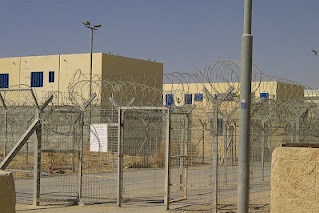 Saharonim Detention Center
Saharonim Detention Center
Hearings on the new amendment to the Law to Prevent Infiltration continued in the Knesset’s Internal Affairs Committee this week as the committee prepares to submit the fast-tracked legislation to the Knesset for second and third readings next week. On Tuesday (November 26), Knesset Legal Advisor Eyal Yinon submitted his advisory opinion in which he warned that the new amendment raises serious constitutional issues, especially in light of the September 16 High Court of Justice decision to strike down the previous amendment to the law as unconstitutional.
The government is moving with extraordinary swiftness to pass the bill before the expiration of the 90-day period set by the Court by which asylum seekers detained under the overturned amendment must be released.
Attorney Yinon’s advisory opinion highlights several problems with the new bill:
- Regarding the bill’s requirement that newly arrived illegal immigrants be imprisoned for one year, Yinon clarified that although this period is shorter than the three year period voided by the High Court of Justice, several of the justices opined that any prolonged detention used as a means of deterrence is improper, and that imprisoning people who cannot be deported is unconstitutional. Yinon also raised the question of whether there is in fact a need for such powerful deterrence methods given that the number of “infiltrators” currently arriving in Israel is near zero.
- Regarding the “open” facility, Yinon pointed out that there will be only 3,500 slots in the facility while there are tens of thousands of “infiltrators” in Israel. Accordingly, individuals’ rights stand to be violated in a discriminatory and selective manner without justification. Moreover, the facility’s remote location and management by the Israel Prisons Services, whose disciplinary measures and operational imperatives are similar to those employed in prisons, are likely result in the facility being run as a de facto prison. He warned that calling the facility “open” is insufficient; to pass scrutiny there must be a real difference between the “open facility” and an ordinary detention center.
Attorney Oded Feller, Director of Citizenship and Residency Program at the Association for Civil Rights in Israel (ACRI): “the Legal Advisor’s wording was careful, but the conclusion from his opinion is clear. The bill raises serious constitutional difficulties and contradicts the majority opinion of the High Court Justices. The facility, which will detain asylum seekers indefinitely, is a prison for all intents and purposes. The bill deals with the imprisonment of a few thousand individuals among the tens of thousands of asylum seekers. It does not deal with the breadth of the phenomenon and does not provide a solution to the plight of the asylum seekers and Israeli residents of disadvantaged neighborhoods. The government must withdraw this bill and consider, in accordance with the guidance of the Court, calmly and intelligently legislating humane arrangements relating to all aspects of the issue.”
The bill is expected to be brought to the plenary for second and third readings on Wednesday, December 4, 2013.







